Fleurs du Mal Magazine


Or see the index
A poet and anthropologist explores the surprising world of war games in mock Middle Eastern villages in which the U.S. military trains.
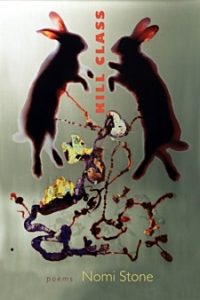 With deft lyrical attention, these documentary poems reveal the nuanced culture and violence of the war machine—alive and well within these basecamp villages, the American military, and, ultimately, the human heart.
With deft lyrical attention, these documentary poems reveal the nuanced culture and violence of the war machine—alive and well within these basecamp villages, the American military, and, ultimately, the human heart.
Kill Class is based on Nomi Stone’s two years of fieldwork in mock Middle Eastern villages at military bases across the United States.
The speaker in these poems, an anthropologist, both witnesses and participates in combat training exercises staged at “Pineland,” a simulated country in the woods of the American South, where actors of Middle Eastern origin are hired to theatricalize war, repetitively pretending to bargain and mourn and die.
Kill Class is an arresting ethnography of American military culture, one that allows readers to circle at length through the cloverleaf interchanges where warfare nestles into even the most mundane corners of everyday life.
Nomi Stone is a poet, anthropologist, and author of a previous book of poems, Stranger’s Notebook (TriQuarterly, 2008). Winner of a 2018 Pushcart Prize, Stone’s poems appear recently in POETRY Magazine, American Poetry Review, The Best American Poetry, The New Republic, Tin House, New England Review, and elsewhere. Stone has a PhD in Cultural Anthropology from Columbia University, an MPhil in Middle East Studies from Oxford, and an MFA in Poetry from Warren Wilson College. She teaches at Princeton University and her ethnography in progress, Human Technology and American War, is a finalist for the University of California Press Atelier Series.
Kill Class
by Nomi Stone (Author)
Paperback
87 pages
Publisher: Tupelo Press
February 1, 2019
Language: English
Poetry
ISBN-10: 1946482196
ISBN-13: 978-1946482198
$17.95
# new poetry
Kill Class
by Nomi Stone
• fleursdumal.nl magazine
More in: *War Poetry Archive, - Book News, - Book Stories, Archive S-T, Archive S-T, Art & Literature News, WAR & PEACE
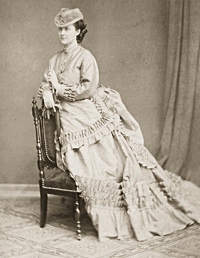
Von Liebe
Am Abend sprach das Meer und flüsterte:
Ihr schönen Mägdelein, erzählt mir leise,
Ich will die Liebe wissen! Redet mir
So von der Liebe, gleich als sollte ich
Dran sterben, so als müsst’ in Ruhe ich
Versinken dran, als könnte sie vorm Sturme
Mich schützen, dass so wütend er nicht mehr
Auf mich sich stürzte! – O! so sprachen da
Die Mägdelein, – Wir wissen wahrlich nicht,
Du armes Meer, ob wir erzählen dürfen;
Denn nimmermehr würdst du in wilder Kraft
Die Schiffe schleudern wollen, und der Felsen
Sorgenumwölbte Stirn mit Schaume peitschen,
Noch wälzen unter jähe, grüne Klippen
Der Sterne Blicken. Glaub’ uns Meer, Du wolltest
So mächtig nimmer sein, so scheu und spröde,
In deinen Schoß und in dein Herz nicht mehr
Die schlafumfangnen Menschenherzen saugen.
Du würdest dann gleich uns den Himmel ansehn,
Und ihn nicht sehen, lächeln, wie der Wind
Vorüberweht, und weinen, weil die Sonne
Aufgeht! Nein! wir werden nichts erzählen!
Carmen Sylva
(1843-1916)
Von Liebe
Gedicht
• fleursdumal.nl magazine
More in: Archive S-T, Archive S-T, CLASSIC POETRY
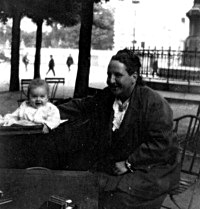
Mrs. Whitehead
But you like it.
They can’t any of them be quite as bad because they learned french but I never did.
He doesn’t look dead at all.
The wind might have blown him.
He comes from that direction. That’s the way.
They are not knotted. Have you smelt it. What would you suggest, your advice I have come across three or four.
So they are the others.
Separate them.
It does make one come, he is extraordinarily charming and endearing once of twice only twice I think.
He is not staying out that’s hard beside that what does he do.
That’s long for his mother.
She travelled from this rest. She crocheted from this nest.
She crocheted from this nest. I thought it wasn’t ever.
It’s one of my favorite ones this.
And yet not this.
Isn’t it funny.
It isn’t.
Break or breaking, very fair, break or very wanting.
I tried it this way before.
Very difficult to change extra places and yet I can agree. I can agree by that. I rest this piece of it and it’s nearly the same climate. I will tell you why they want a real door. They choose it.
They do so and very pure water. They are safe when they take a bath. Oh it is very. Oh it is.
In a way a vest.
I do think you get what you want.
Corrections.
It is eleven weeks from the middle of September. I glance in a way.
It is eleven weeks from the middle of September.
Total recollect others.
I glance at and I can recollect others. I make a division neatly, I close.
What is wrong with not blue. That is right with apples. Apples four. For. Fore.
Before that.
Next stretching.
Next for that leaf stretching.
I do not state leaf.
I like to beg very much stream.
Not exactly in state.
Understate.
All in so.
They expect all the blues to take of all the other families, the whites are extra they are beside all that, they make a little house and through and beside that they live in Paris.
Hardly enough for wood.
Not a color even.
By now a change of grass and wedding rings and all but the rest plan. I don’t care I won’t look.
I am not sure that yellow is good. I am tall.
Allow that. I don’t want any more out in conversation.
I can be careful.
Not within wearing it.
I cannot say to stay.
No please don’t get up.
And now that.
Yes I see.
Did you pay him for that whether for a spider and such splendor and indeed quitting. I meant to gather.
I see it I see it.
Please ocean spoke please Helen land please take it away.
I saw a spoken leave leaf and flowers made vegetables and foliage in soil. I saw representative mistakes and glass cups, I saw a whole appearance of respectable refugees, I did not ask actors I asked pearls, I did not choose to ask trains, I was satisfied with celebrated ransoms. I cannot deny Bertie Henschel is coming tomorrow. Saturdays are even. There is a regular principle, if you mention it you mention what happened.
What do you make of it.
You exceed all hope and all praise.
Stein, Gertrude
(1874-1946)
Mrs. Whitehead
fleursdumal.nl magazine
More in: Archive S-T, Archive S-T, Gertrude Stein, Stein, Gertrude
Counting Her Dresses
A Play
Part I.
ACT I.
When they did not see me.
I saw them again.
I did not like it.
ACT II.
I count her dresses again.
ACT III.
Can you draw a dress.
ACT IV.
In a minute.
Part II.
ACT I.
Believe in your mistake.
ACT II.
Act quickly.
ACT III.
Do not mind the tooth.
ACT IV.
Do not be careless.
Part III.
ACT I.
I am careful.
ACT II.
Yes you are.
ACT III.
And obedient.
ACT IV.
Yes you are.
ACT V.
And industrious.
ACT VI.
Certainly.
Part IV.
ACT I.
Come to sing and sit.
ACT II.
Repeat it.
ACT III.
I repeat it.
Part V.
ACT I.
Can you speak quickly.
ACT II.
Can you cough.
ACT III.
Remember me to him.
ACT IV.
Remember that I want a cloak.
Part VI.
ACT I.
I know what I want to say. How do you do I forgive you everything and there is nothing to forgive.
Part VII.
ACT I.
The dog. You mean pale.
ACT II.
No we want dark brown.
ACT III.
I am tired of blue.
Part VIII.
ACT I.
Shall I wear my blue.
ACT II.
Do.
Part IX.
ACT I.
Thank you for the cow.
Thank you for the cow.
ACT II.
Thank you very much.
Part X.
ACT I.
Collecting her dresses.
ACT II.
Shall you be annoyed.
ACT III.
Not at all.
Part XI.
ACT I.
Can you be thankful.
ACT II.
For what.
ACT III.
For me.
Part XII.
ACT I.
I do not like this table.
ACT II.
I can understand that.
ACT III.
A feather.
ACT IV.
It weighs more than a feather.
Part XIII.
ACT I.
It is not tiring to count dresses.
Part XIV.
ACT I.
What is your belief.
Part XV.
ACT I.
In exchange for a table.
ACT II.
In exchange for or on a table.
ACT III.
We were satisfied.
Part XVI.
ACT I.
Can you say you like negro sculpture.
Part XVII.
ACT I.
The meaning of windows is air.
ACT II.
And a door.
ACT III.
A door should be closed.
Part XVIII.
ACT I.
Can you manage it.
ACT II.
You mean dresses.
ACT III.
Do I mean dresses.
Part XIX.
ACT I.
I mean one two three.
Part XX.
ACT I.
Can you spell quickly.
ACT II.
I can spell very quickly.
ACT III.
So can my sister-in-law.
ACT IV.
Can she.
Part XXI.
ACT I.
Have you any way of sitting.
ACT II.
You mean comfortably.
ACT III.
Naturally.
ACT IV.
I understand you.
Part XXII.
ACT I.
Are you afraid.
ACT II.
I am not any more afraid of water than they are.
ACT III.
Do not be insolent.
Part XXIII.
ACT I.
We need clothes.
ACT II.
And wool.
ACT III.
And gloves.
ACT IV.
And waterproofs.
Part XXIV.
ACT I.
Can you laugh at me.
ACT II.
And then say.
ACT III.
Married.
ACT IV.
Yes.
Part XXV.
ACT I.
Do you remember how he looked at clothes.
ACT II.
Do you remember what he said about wishing.
ACT III.
Do you remember all about it.
Part XXVI.
ACT I.
Oh yes.
ACT II.
You are stimulated.
ACT III.
And amused.
ACT IV.
We are.
Part XXVII.
ACT I.
What can I say that I am fond of.
ACT II.
I can see plenty of instances.
ACT III.
Can you.
Part XXVIII.
ACT I.
For that we will make an arrangement.
ACT II.
You mean some drawings.
ACT III.
Do I talk of art.
ACT IV.
All numbers are beautiful to me.
Part XXIX.
ACT I.
Of course they are.
ACT II.
Thursday.
ACT III.
We hope for Thursday.
ACT IV.
So do we.
Part XXX.
ACT I.
Was she angry.
ACT II.
Whom do you mean was she angry.
ACT III.
Was she angry with you.
Part XXXI.
ACT I.
Reflect more.
ACT II.
I do want a garden.
ACT III.
Do you.
ACT IV.
And clothes.
ACT V.
I do not mention clothes.
ACT VI.
No you didn’t but I do.
ACT VII.
Yes I know that.
Part XXXII.
ACT I.
He is tiring.
ACT II.
He is not tiring.
ACT III.
No indeed.
ACT IV.
I can count them.
ACT V.
You do not misunderstand me.
ACT VI.
I misunderstand no one.
Part XXXIII.
ACT I.
Can you explain my wishes.
ACT II.
In the morning.
ACT III.
To me.
ACT IV.
Yes in there.
ACT V.
Then you do not explain.
ACT VI.
I do not press for an answer.
Part XXXIV.
ACT I.
Can you expect her today.
ACT II.
We saw a dress.
ACT III.
We saw a man.
ACT IV.
Sarcasm.
Part XXXV.
ACT I.
We can be proud of tomorrow.
ACT II.
And the vests.
ACT III.
And the doors.
ACT IV.
I always remember the roads.
Part XXXVI.
ACT I.
Can you speak English.
ACT II.
In London.
ACT III.
And here.
ACT IV.
With me.
Part XXXVII.
ACT I.
Count her dresses.
ACT II.
Collect her dresses.
ACT III.
Clean her dresses.
ACT IV.
Have the system.
Part XXXVIII.
ACT I.
She polished the table.
ACT II.
Count her dresses again.
ACT III.
When can you come.
ACT IV.
When can you come.
Part XXXIX.
ACT I.
Breathe for me.
ACT II.
I can say that.
ACT III.
It isn’t funny.
ACT IV.
In the meantime.
Part XL.
ACT I.
Can you say.
ACT II.
What.
ACT III.
We have been told.
ACT IV.
Oh read that.
Part XLI.
ACT I.
I do not understand this home-coming.
ACT II.
In the evening.
ACT III.
Naturally.
ACT IV.
We have decided.
ACT V.
Indeed.
ACT VI.
If you wish.
Gertrude Stein
(1874-1946)
Counting Her Dresses.
A Play
fleursdumal.nl magazine
More in: Archive S-T, Archive S-T, Gertrude Stein, Stein, Gertrude, THEATRE
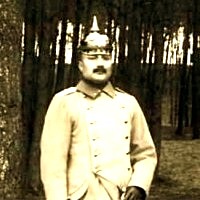
Erfüllung
Meine Sporen frechzen deine Spitzen!
Bläulich kichern die Aederchen fort
In Sicherheit höhnisch
Im
Schimmrigen Weich
Bebige Hügel wiegen Verlangen
Köpfchen rosen empor und steilen Gewähr.
Die Lippe zerfrißt sich!
Golden ringeln Würger hinunter
Und schnüren den Hals zu
Nach meinen Fingern tastet dein Blut
Und siedet den Kampf.
Die Seelen ringen und kollern abseit!
Hoch schlagen die Röcke den Blick auf
Goldhellrot
Rotweichrot
Flamme zischt in das Hirn
Und sticht mir das Schaun aus!
Sinken Sinken
Schweben und Sinken
Schwingen im Sturme
Im Sturm
Im schreikrollen Meer!
Ziegelrot
Ueber uns segnet der Tod
Säender Tod!
August Stramm
(1874-1915)
Erfüllung, 1914
• fleursdumal.nl magazine
More in: *War Poetry Archive, Archive S-T, Expressionism, Stramm, August

Ich
Du steht! Du steht!
Und ich
Und ich
Ich winge
Raumlos zeitlos wäglos!
Du steht! Du steht!
Und
Rasen bäret mich
Ich
Bär mich selber!
Du!
Du!
Du bannt die Zeit
Du bogt der Kreis
Du seelt der Geist
Du blickt der Blick
Du
Kreist die Welt
Die Welt
Welt!
Ich
Kreis das All!
Und du
Und du
Du
Stehst
Das Ich
Das
Ich!
August Stramm
(1874-1915)
Ich, 1914
• fleursdumal.nl magazine
More in: *War Poetry Archive, Archive S-T, Expressionism, Stramm, August
Hannah Sullivan’s debut collection is a revelation – three long poems of fresh ambition, intensity, and substance.
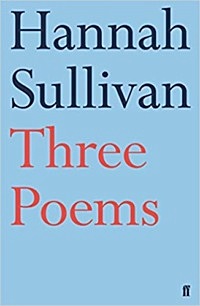 Though each poem stands apart, their inventive and looping encounters make for a compelling unity.
Though each poem stands apart, their inventive and looping encounters make for a compelling unity.
“You, Very Young in New York” captures a great American city, in all its alluring detail. It is a wry and tender study of romantic possibility, disappointment, and the obduracy of innocence.
“Repeat until Time” begins with a move to California and unfolds into an essay on repetition and returning home, at once personal and philosophical.
“The Sandpit after Rain” explores the birth of a child and the loss of a father with exacting clarity.
In Three Poems, readers will experience Sullivan’s work with the same exhilaration as they might the great modernizing poems of Eliot and Pound, but with the unique perspective of a brilliant new female voice.
Hannah Sullivan lives in London with her husband and two sons and is an Associate Professor of English at New College, Oxford. She received her PhD from Harvard in 2008 and taught in California for four years.
She is currently associate professor of English at New College, Oxford. Her study of modernist writing, The Work of Revision, was published in 2013 and awarded the Rose Mary Crawshay Prize by the British Academy. Her debut poetry collection, Three Poems, was published by Faber in 2018 and was awarded the prestigious TS Eliot Prize.
Three Poems
by Hannah Sullivan
Paperback: 80 pages
Publisher: Faber & Faber; Main edition (18 Jan. 2018)
Language: English
ISBN-10: 9780571337675
ISBN-13: 978-0571337675
ASIN: 0571337678
Product Dimensions: 15.9 x 1.3 x 21 cm
# new poetry
Three Poems
by Hannah Sullivan
• fleursdumal.nl magazine
More in: - Book News, - Bookstores, Archive S-T, Archive S-T, Art & Literature News, Awards & Prizes

Weltwehe
Nichts Nichts Nichts
Haucht
Nichts
Hauchen
Nichts
Hauch
Wägen
Wägen wegen
Wegen regen
Stauen
Lauen
Weben schweben wallen ballen
Warmen
Biegen bogen
Wärmen
Drehen drehen
Dunsten
Streifen glimmen
Fachen
Hitzen
Glühen
Wellen
Sieden brodeln rauschen brausen
Züngeln springen
Flammen spritzen
Platzen
Knattern knallen krachen
Tausend
Null Null Null
Tausend
Null
Milliarden
Null Null Null
Weißen
Lichten
Kreisen kreisen
Bahnen
Fliegen
Kreisen kreisen
Rollen
Kugeln
Kugeln kugeln
Glatten
Kugeln
Platten
Kugeln
Kreisen
Kugeln
Dichten schichten wichten walzen wälzen
Festen
Kreisen
Pressen
Kugeln
Schmieden
Kreisen
Kernen
Kugeln
Kern.
Halten fassen kraften schwingen
Ruhen reißen sprengen
Heben senken falten
Schieben wogen
Starren
Heißen
Beben
Schweißen
Beben
Leben
Atmen
Leben
Leben leben
Zeugen
Bären
Leben leben
Blühen
Wachsen
Leben leben
Brennen
Starken
Marken
Rollen rollen
Leuchten trocknen feuchten lichten
Streben ranken
Tönen
Ringen
Kämpfen
Ringen
Ringen
Können
Wollen
Können
Schwanken
Können
Wollen
Blühen
Wollen
Rollen
Können
Kranken
Placken racken ächzen
Rollen
Wollen
Lallen
Wollen wollen
Ranken
Wollen wollen
Rollen
Drehen wehen rollen
Wollen wollen
Stürmen wollen
Drehen
Matten
Wollen
Matten
Rollen drehen
Wehen wehen
Wollen
Kreisen
Engen
Kreisen
Engen
Schwanken
Wanken
Zittern
Schwingen
Wiegen kreisen engen lockern
Trudeln krudeln
Trudeln
Schlacken
Lockern
Schlacken
Bröckeln
Aschen
Trollen trollen
Aschen
Trollen trollen
Sollen
Wollen
Stocken reißen
Sacken rasen
Rasen
Sprengen
Platzen
Schmettern
Stäuben stäuben stäuben
Schweben
Weben
Wallen
Weben
Fallen
Wegen
Reigen
Wolken
Schleichen
Flaken
Weiten
Flaken
Wachten
Steinen
Nachten
Nebeln
Nachten
Weiten
Nachten nachten
Losen
Nachten nachten
Lösen
Nachten nachten
Raumen
Nachten nachten
Zeiten
Nachten
Weiten raumen zeiten
Nachten
Zeiten zeiten
Nachten
Zeiten
Nachten
Weiten
Weiten
Nichts Nichts Nichts
Nichts.
August Stramm
(1874-1915)
Weltwehe, 1914
• fleursdumal.nl magazine
More in: *War Poetry Archive, Archive S-T, Expressionism, Stramm, August

Der Krieg
Aus Plewna wandert ein Geisterzug,
Die türkischen Helden gefangen,
In Fetzen und barfuss, von Hunger verzehrt,
Die Glieder schlottern und hangen.
Viel Tausende wanken wie Schatten dahin,
Zur Donau ziehen die Armen,
Die nächtlichen Wolken durchheult der Wind,
Laut brüllend, wie Schlachtenerbarmen.
In lautloser Stille, so wandern sie hin
Durch schneeverdichtete Fluren,
Bedeckt mit Leichen – die Raben und Kräh’n
Verkünden der Fallenden Spuren.
Nur Leichen liegen von Plewna hin
Zur Donau in Reihen gesäet,
Ein grässlich’ Schlachtfeld, wo Ross und Mann
Am Wagen erfroren, verwehet.
Die Wandernden schreien um Hülfe noch,
Dann knien sie, beten stille,
Mit ihren Armen gen Morgenland,
Und sterben -‘s ist Allahs Wille.
Von Plewna zur Donau, wer Kräfte hat,
Vollendet die grausige Reise,
Da glitzert düster im Abendrot
Nicropolis, starrend von Eise.
Und rings ertönt ein Heulen und Schrei’n:
“O wollet uns Speise doch geben!
Was habt Ihr nicht lieber erschossen uns gleich!”
Die Lüfte, die eisigen, beben.
Zehntausend Gefangene schreien nach Brot,
Kein Brot ist zur Stunde zu haben,
Und markerschütternd durchtobt der Schrei
Die Straßen, die Wälle, den Graben.
Zehntausend liegen in jener Nacht
Verhungernd, mit sterbendem Munde,
Die Sieger sind selber von Tod bedroht –
Kein Brot! und nur Eis in der Runde!
Kein Brot! Und von jenseits da winkt das Land,
In dem lange verheißenen Frieden,
Doch hat sie die Donau mit krachendem Eis
In gewaltigen Massen geschieden.
Kein Brot! und es frieret in jener Nacht,
Als hätte Natur sich geschworen,
Den beiden Heeren den Untergang,
Fast waren sie alle verloren.
Doch endlich grauet der Tag, es kann
Die Panzerbarkasse nun wagen,
Vom Eis getragen! ein wenig Brot
Zu gemarterten Helden zu tragen.
Carmen Sylva
(1843-1916)
Der Krieg
Gedicht
• fleursdumal.nl magazine
More in: Archive S-T, Archive S-T, CLASSIC POETRY, WAR & PEACE
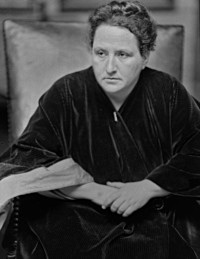 A Poem About Waldberg
A Poem About Waldberg
What I am afraid of is that they will just attract an awful bombardment on themselves in which they will have to be supported.
Oh no they won’t do that.
I don’t think they will do that.
What I think is that I will have to reach the country before I ask myself the way to see the city.
I don’t mean this as a joke.
I know very well that I know all about nurses. Who doesn’t. And who would like to see children win. I love my boy very much. His mother feeds him. I can smile and think of it. We both laugh together. Altogether I have said to them keep still.
Curtains a japanese curtain.
Complete flowers.
I never use a pass.
Of course you wouldn’t.
You wouldn’t be careful enough. I don’t mean that.
How can I hear him speak. You don’t mean a victim. Eugene Paul. What is Walberg’s name.
I don’t care for him.
I am not sorry for her.
I do not have flowers here.
C A L I F O R N I A
Let me see. What do you say. They can take care of riches. Kiss my hand. Why. Because Russians are rich. All Russians are valuable. That is what I said.
I wish I could be as funny as he is.
Yes thank you I believe in Russia.
Gertrude Stein
(1874-1946)
A Poem About Waldberg
• fleursdumal.nl magazine
More in: Archive S-T, Archive S-T, Gertrude Stein, Stein, Gertrude
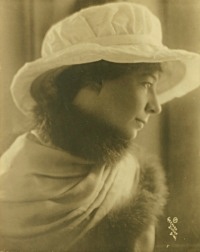
The Look
Strephon kissed me in the spring,
Robin in the fall,
But Colin only looked at me
And never kissed at all.
Strephon’s kiss was lost in jest,
Robin’s lost in play,
But the kiss in Colin’s eyes
Haunts me night and day.
Sara Teasdale
(1884-1933)
The Look
• fleursdumal.nl magazine
More in: Archive S-T, Archive S-T, Teasdale, Sara

Feuertaufe
Der Körper schrumpft den weiten Rock
Der Kopf verkriecht die Beine
Erschrecken
Würgt die Flinte
Ängste
Knattern
Knattern schrillen
Knattern hieben
Knattern stolpern
Knattern
Übertaumeln
Gelle
Wut.
Der Blick
Spitzt
Zisch
Die Hände spannen Klaren.
Das Trotzen ladet.
Wollen äugt
Und
Stahler Blick
Schnellt
Streck
Das
Schicksal.
August Stramm
(1874-1915)
Feuertaufe, 1914
• fleursdumal.nl magazine
More in: *War Poetry Archive, Archive S-T, Expressionism, Stramm, August
Thank you for reading Fleurs du Mal - magazine for art & literature